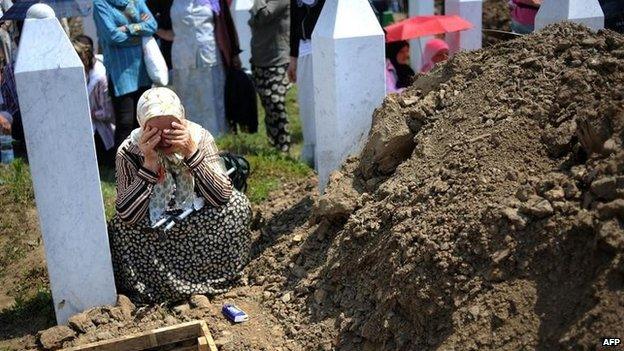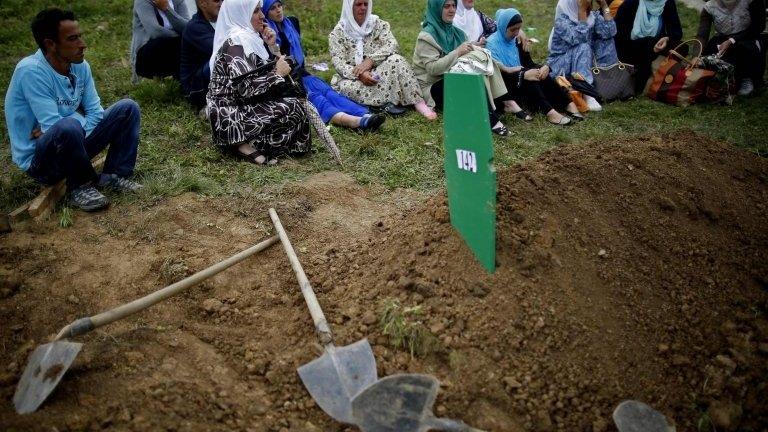Srebrenica massacre verdicts upheld at war crimes tribunal
- Published

About 8,000 Bosnian men and boys were killed in Srebrenica over just three days
A judge at the UN Yugoslav tribunal has upheld the convictions of five men for their role in the Srebrenica massacre.
Sentences for four of the men, high-ranking officials in the Bosnian Serb Army in 1995, were also confirmed.
They had appealed against their convictions in 2010, external for a range of crimes including genocide.
About 8,000 Bosnian men and boys were killed in Srebrenica in just three days in 1995 - the worst atrocity on European soil since the Holocaust.
Two of the men - Vujadin Popovic and Ljubisa Beara - are among just a few to have been found guilty of genocide.
They were sentenced to life for deliberately targeting and destroying groups of people based on their ethnicity.
Those life sentences were confirmed on Friday, as were the sentences of 35 years for Drago Nikolic, and 13 years for Vinko Pandurevic. The sentence of the fifth man, Radivoge Miletic, was reduced from 19 to 18 years.
The atrocity took place a few months before the end of the Bosnian war, when 20,000 refugees fled to Srebrenica to escape Serb forces.
It was an enclave protected by UN Dutch soldiers but was overrun by paramilitary troops led by the Bosnian Serb commander Ratko Mladic - after which reports of atrocities began to emerge.
Some of the accused reported directly to Gen Mladic - who is himself currently on trial at the tribunal in The Hague, also accused of genocide.


The accused
Vujadin Popovic
Pleaded not guilty to all charges. Convicted of genocide, crimes against humanity, violation of the laws or customs of war in June 2010; sentenced to life imprisonment
Ljubisa Beara
Pleaded not guilty to all charges. Convicted of genocide, crimes against humanity, violation of the laws or customs of war; sentenced to life imprisonment
Drago Nikolic
Pleaded not guilty to all charges. Convicted of aiding and abetting genocide, crimes against humanity, violation of the laws or customs of war; sentenced to 35 years in jail
Radivoge Miletic
Pleaded not guilty to all charges. Convicted of crimes against humanity; sentenced to 19 years in jail
Vinko Pandurevic
Pleaded not guilty to all charges. Convicted of crimes against humanity and violation of the laws or customs of war; sentenced to 13 years in jail
Source: ICTY

Their lawyers argued that there had been a miscarriage of justice and that there were factual errors in the original judgement.
They claimed that that one of the defendants was involved in a plea bargain designed to falsely incriminate the others.
Families of the victims were at court to hear the decision on the convicted men's appeals.
The International Criminal Tribunal for the former Yugoslavia (ICTY) was set up to deal with war crimes in the Balkans.

Timeline of Srebrenica siege:, external
6-8 July 1995: Bosnian Serb forces start shelling Srebrenica enclave
9 July: Bosnian Serbs step up shelling; thousands of Bosnian Muslim refugees flee to Srebrenica
10 July: Dutch peacekeepers request UN air support after Bosnian Serbs shell Dutch positions. Large crowds of refugees gather around Dutch positions
11 July: More than 20,000 refugees flee to main Dutch base at Potocari. Serbs threaten to kill Dutch hostages and shell refugees after Dutch F-16 fighters bomb Serb positions. Bosnian Serb commander Ratko Mladic enters Srebrenica and delivers ultimatum that Muslims must hand over weapons
12 July: An estimated 23,000 women and children are deported to Muslim territory; men aged 12-77 taken "for interrogation" and held in trucks and warehouses
13 July: First killings of unarmed Muslims take place near village of Kravica. Peacekeepers hand over some 5,000 Muslims sheltering at Dutch base in exchange for the release of 14 Dutch peacekeepers held by Bosnian Serbs
14 July: Reports of massacres start to emerge

- Published16 July 2014

- Published11 July 2010